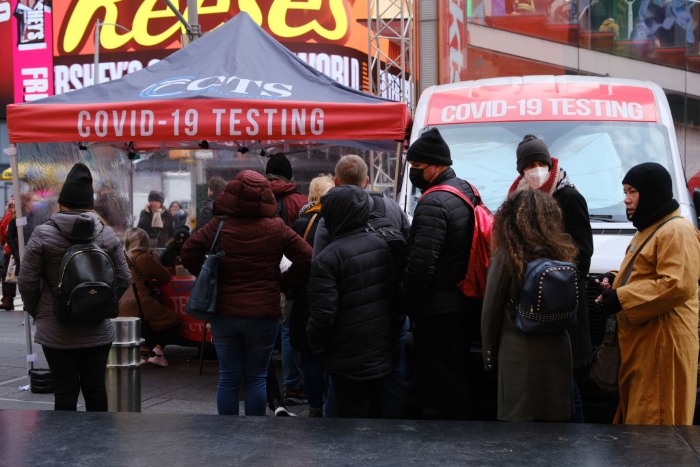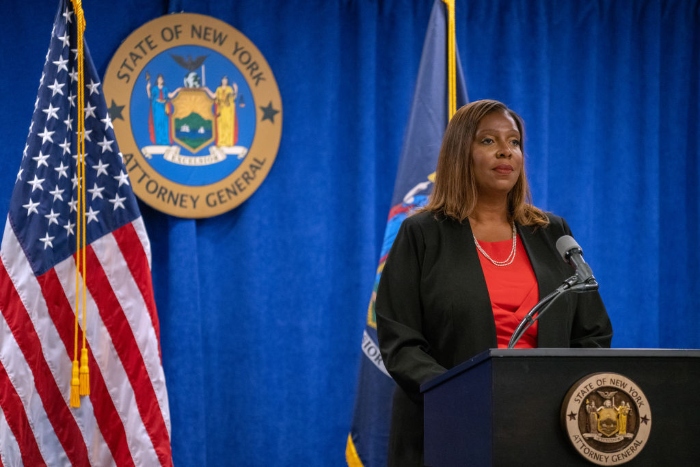| | |  | BY MYAH WARD | | With help from Tyler Weyant
| 
People wait in line to get tested for Covid-19 at a testing facility in Times Square in New York City. | Spencer Platt/Getty Images | CONNECT THE DOTS — It’s been two weeks since South African scientists alerted the world of a new Covid variant on Friday, Nov. 26. Two weeks is also the amount of time the president’s top health adviser, Anthony Fauci, said it would take to get a better idea of what we’re dealing with when it comes to Omicron. On cue, new info has been trickling out of South Africa this week, suggesting that while the variant is spreading like wildfire in the country, it’s possible the disease it causes is less severe — though it’s still way too early to really tell. As for how Omicron will affect the U.S., figuring that out in two weeks was a “little optimistic,” Charles Chiu, an infectious diseases researcher at the University of California San Francisco, told Nightly. We have the genomic sequencing data and capabilities, Chiu said. The problem is the U.S. lacks the infrastructure to quickly turn this information into action. Unlike South Africa, the U.S. has a fractured virus surveillance system, with some states sequencing Covid cases at high percentages and others just examining a small number of samples. There’s no national standard for genomic virus sequencing, he said, and the result is an incomplete and biased picture of the current state of the virus — one that tends to ignore rural and minority populations. It took U.S. health officials an extra five days — until Dec. 1 — to detect Omicron, meaning we’re about a week behind South Africa, which has one of the world’s most robust national surveillance systems, Chiu pointed out. Once a country has access to a variant, it can take scientists up to two weeks to grow enough of a virus like Omicron for widespread distribution to labs, Chiu said. After that, scientists can conduct studies on the variant’s transmissibility, severity and ability to evade vaccines. Results from these studies in the U.S. will continue to roll out in the coming days and weeks. There are a few reasons the U.S. was slow to identify a case from the new variant. Factors like population size and Omicron’s origin across the Atlantic Ocean, either in Europe or Africa, put us behind. But so did the U.S. system of public health, Chiu said. Time is important — many U.S. labs don’t sequence a sample until two weeks after it’s collected, he said. This means the data is almost useless for contact tracing and other public health measures. And U.S. labs are also not sharing the right data. The genome itself is virtually useless, Chiu said. You also need metadata attached to the sample, which would include valuable information such as the demographics of the person infected, whether they had symptoms, the severity of disease, and vaccination status. “We don’t have this sort of sample-to-answer-to-action pipeline that’s really needed to provide information as soon as possible,” Chiu said. In the U.K., sequencing labs are processing hundreds to thousands of samples a day, Chiu said, tagging and annotating them with clinical metadata that’s then fed to hospitals and the country’s public health agency, so the information can immediately be applied in both clinical and public health decision making. Nothing like that happens in the U.S. States like California have set goals to sequence 20 percent of Covid cases. But these samples aren’t linked to any clinical metadata, which Chiu blames on the lack of a national health care system in the U.S., as well as privacy and confidentiality concerns. “On a national level, in some cases, we were unable to even release the ZIP code of where the sequence came from. Much less identifying information like potentially age or sex, or gender,” he said. Finding a way to address this information-sharing blockade will be key to preventing future pandemics, he said. The U.S. can’t necessarily overhaul its entire health care system, Chiu said, but he thinks it should be possible to set new standards for how we collect and share public health data. “We know that it’s only a matter of time before we’re going to see another virus or even a relative of this virus emerge and become the next pandemic,” Chiu said. “The next critical step that needs to be made is that we need to more tightly integrate our national surveillance system.” Welcome to POLITICO Nightly. Reach out with news, tips and ideas at nightly@politico.com. Or contact tonight’s author at mward@politico.com, or on Twitter at @MyahWard.
| |
A message from UnitedHealth Group: UnitedHealth Group recognizes the environment is a key part of what makes the communities in which we live and work sustainable, viable and healthy. We are doing our part by committing to achieve operational net zero emissions by 2035 and working towards a paperless consumer and provider experience in the next 2 to 3 years. Learn more. | | | | | | 
New York Attorney General Letitia James presents the findings of an independent investigation into then-New York Gov. Andrew Cuomo in August in New York City. | David Dee Delgado/Getty Images | THE DISH ON TISH — In a year that’s seen plenty of shocks in Albany, New York’s capital got another big stunner today: Tish James announced she would end her gubernatorial campaign and instead run for reelection as attorney general. To find out more about what drove James’ decision, and how the Democratic field for governor is shaping up now, Nightly’s Tyler Weyant chatted with New York Playbook co-author Anna Gronewold. This conversation has been edited. In the AG race James is headed to, does she clear the field with this move? And do folks in Albany expect her office will be making big moves as we head in 2022? Good questions. Another dynamic at play is that a couple of politicians who were clearly interested in becoming AG hadn’t declared their candidacies yet, making us wonder if they were suspecting James wasn’t catching fire. Running in an open field was one thing, but running against a popular incumbent and the first Black woman to hold the office? “I’m not trying to commit political suicide,” one of the potential, but undeclared, candidates told me. But at least five Democrats had already declared their campaigns. At least one has already dropped out, at least one has said they are absolutely not dropping out, and the rest haven’t answered our calls yet. There will be a primary, but Tish has an extreme advantage and should be pretty solid on fundraising for an incumbent AG campaign. Continuing the work as AG is the reason she’s putting forth to suspend her gubernatorial campaign, and shortly before she made that announcement today, several news outlets reported that she is continuing to pursue her office’s high-profile probes into former president Donald Trump. A source familiar with the matter told us James is seeking a deposition from Trump on Jan. 7 at her New York offices as part of her investigation into potential fraud inside the Trump Organization. Funny the timing on that news! James’ announcement seemed to take New York politicos by surprise. Did you have any indication at all this was coming? Tish James seems to be fond of surprising everyone with timing, but I will offer my gratitude that it’s rarely at 5 p.m. on a Friday. There have been tea leaves, especially in the past few weeks. Candidates aren’t required to report their fundraising until January, but several sources suggested hers wasn’t going to come even close to Gov. Kathy Hochul’s, who has raised more than $10 million for her reelection campaign since announcing in August. And there was hardly any momentum in the early days when she announced. That seemed to slow even more in the past few weeks, as Bill Mahoney reported just this week . Her public and media fronts have been extremely limited, this from a seasoned politician who is employing seasoned consultants to run her campaign. But if she dropped out, most people I speak with were predicting some time after the holidays but before the state party convention around February. With James out, how do you see the governor’s race changing the next few months? Is Hochul the person to beat? Will we see a splashy Bill de Blasio entry soon? Yes, Hochul was already the frontrunner. Polling from earlier this week showed that she was ahead of James (her closest opponent) with 36 percent of Democrats’ support, compared to 18 percent backing James. Other contenders weren’t in great spots: 10 percent supported New York City Public Advocate Jumaane Williams, and 6 percent each backed Rep. Tom Suozzi and New York City Mayor Bill de Blasio. De Blasio, we should note, remains clearly interested, but has not declared candidacy yet. But most of James’ support would likely go to Hochul. For instance, Brooklyn party chair Assemblymember Rodneyse Bichotte Hermelyn endorsed Hochul just minutes after James announced she was dropping out. Bichotte Hermelyn was someone who had publicly expressed strong support for James’ campaign as a Black woman and Brooklyn native. And Brooklyn would be a pretty big get for any Dem these days in a primary. Obviously there’s a lot of time before the primary and polling has more recently … not been the valuable source of information we'd like. But, pending any wacky circumstances or political missteps, Hochul’s in an extremely strong position with her incumbency, and the support and cash she’s already gathered. The historic nature of her being there also adds an edge — in September, 74 percent of voters — 84 percent of Democrats — said they felt excited to have the first woman governor in office. There would need to be a new political lane opened for someone to try and oust the state’s first woman governor who has had less than a year in office to prove herself. And what Bill de Blasio decides is between him and God.
| |
| | JOIN TUESDAY FOR A WOMEN RULE 2021 REWIND AND A LOOK AHEAD AT 2022: Congress is sprinting to get through a lengthy and challenging legislative to-do list before the end of the year that has major implications for women’s rights. Join Women Rule editor Elizabeth Ralph and POLITICO journalists Laura Barrón-López, Eleanor Mueller, Elena Schneider and Elana Schor for a virtual roundtable that will explore the biggest legislative and policy shifts in 2021 affecting women and what lies ahead in 2022. REGISTER HERE. | | | | | | | — Appeals court denies Trump effort to block White House records from Jan. 6 investigators: A federal appeals court panel has rejected former Trump’s effort to stop congressional Jan. 6 investigators from obtaining his White House records . “On the record before us, former President Trump has provided no basis for this court to override President Biden’s judgment and the agreement and accommodations worked out between the Political Branches over these documents,” wrote Judge Patricia Millett of the U.S. Circuit Court of Appeals for the District of Columbia, joined by Judges Robert Wilkins and Ketanji Brown Jackson. The court delayed the effect of its order for two weeks, allowing Trump’s attorneys time to either ask the full bench of the D.C. Circuit to consider the issue or take it to the Supreme Court. — Senate passes Schumer-McConnell debt limit pact: The Senate passed a one-time loophole tonight to empower Democrats to raise the debt limit on their own , a major step toward warding off mid-December economic fallout. The chamber cleared the bill in a 59-35 vote, sending it on to President Joe Biden. Once signed into law, the measure would give Senate Democrats a free pass to raise the U.S. borrowing limit in a simple-majority vote, rather than facing the usual 60-vote hurdle to move legislation forward. — Biden reaffirms Ukrainian sovereignty support in Zelensky call: Biden today reassured Ukrainian President Volodymyr Zelensky of the United States’ support for Ukraine’s sovereignty, as the country steels itself for a potential Russian invasion on its eastern frontier. “President Biden voiced the deep concerns of the United States and our European Allies about Russia’s aggressive actions towards Ukraine and made clear that the U.S. and our Allies would respond with strong economic and other measures in the event of a further military intervention,” according to a White House readout of the call, which lasted more than an hour.
| |
| | A message from UnitedHealth Group:  
| | | — FDA authorizes Pfizer Covid booster for 16-, 17-year-olds: The Food and Drug Administration authorized a booster dose of the Pfizer-BioNTech Covid-19 vaccine for 16- and 17-year-olds today, giving those teens access to the shots as the Omicron variant spreads worldwide. The decision comes just over a week after the companies first sought the expansion of their emergency use authorization for the vaccine as a booster. Eligible teens will be able to get the shot once they are at least six months past their second dose. — Biden calls summit ‘inflection point’ for democracies: Biden invoked the late civil rights leader Rep. John Lewis and pledged that he would continue to push for the passage of federal voting rights legislation when he commenced his administration’s first Summit for Democracy today. In his opening remarks at the outset of the two-day virtual event, Biden hailed Lewis — the Georgia Democrat who served in Congress for more than three decades and was the youngest leader of the 1963 March on Washington — as “a great champion of American democracy and for civil rights around the world.” — Lawyer: Capitol Police whistleblowers face retaliation: Multiple people who worked in the Capitol Police intelligence division on Jan. 6 raised concerns about the department before and after the insurrection and have since faced retaliation , according to an employment lawyer representing the whistleblowers. “I represent a group of U.S. Capitol Police whistleblowers who worked in IICD [Intelligence and Interagency Coordination Division] on January 6, 2021,” Dan Gebhardt of the Solomon Law Firm, PLLC told POLITICO in a statement. “They have made a multitude of internal complaints regarding gross mismanagement and intelligence failures by certain IICD managers that contributed to the events of January 6, 2021. As a result, there have been multiple retaliatory actions against the whistleblowers, including two proposed removals.”
| | | |
| | |
| | STEP INSIDE THE WEST WING: What's really happening in West Wing offices? Find out who's up, who's down, and who really has the president’s ear in our West Wing Playbook newsletter, the insider's guide to the Biden White House and Cabinet. For buzzy nuggets and details that you won't find anywhere else, subscribe today. | | | | | | | SYSTEM FAILURE — It’s been 20 years since China entered the global trade body, the World Trade Organization, a move that gave it access to the international trade system. Was it worth it? Some officials and lawmakers have regrets, arguing that China’s gains from WTO entry on Dec. 11, 2001, came at an unfair cost to the U.S. economy, Phelim Kine writes. Most U.S. lawmakers who paved the way for China’s accession to the WTO by agreeing to normalize trade relations with China through approval of Permanent Normal Trade Relations in May 2000 would rather not talk about their vote. POLITICO canvassed eight senators still in the chamber who voted in favor of the bipartisan move, as well as one former senator who is now a state governor. The only one to respond, Sen. Chuck Grassley (R-Iowa), said in a statement that China’s WTO accession helped reduce poverty in China and benefited U.S. agriculture, but that “clearly the arrangement hasn’t lived up to our hopes of 20 years ago.”
| |
A message from UnitedHealth Group: The U.S. health care sector is responsible for 8.5% of U.S. emissions. Decarbonizing the health system can help limit the harmful effects of climate change and its impact on marginalized communities.
UnitedHealth Group is partnering with the National Academy of Medicine to meaningfully reduce the carbon footprint of the U.S. health care system.
See how we’re working to minimize our impact on the environment and help create more sustainable, viable and healthy communities. | | |
| |
|
| | Follow us on Twitter | | | FOLLOW US
|
| |
